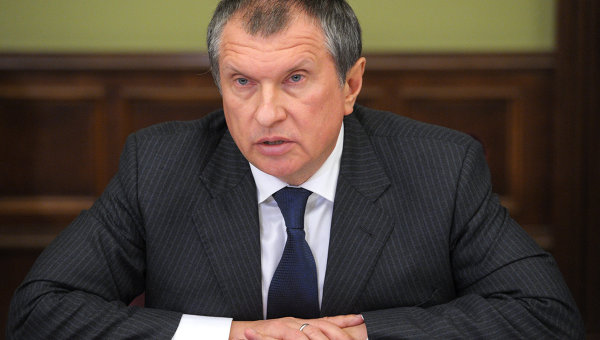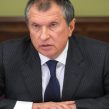
Igor Sechin Door-Crashing in Croatia
Publication: Eurasia Daily Monitor Volume: 10 Issue: 116
By:

Croatia is set to join the European Union as a full member on July 1. This makes Croatia a more attractive object of Russian energy interests. The head of Zarubezhneft (Nikolai Brunich, who has in the meantime taken over as chief of Transneft) visited Zagreb with far-reaching proposals in the oil sector in January. Gazprom’s top managers (Aleksei Miller, Aleksandr Medvedev, Aleksandr Dyukov) visited Croatia shortly thereafter, with multiple project offers in the natural gas and electricity sectors (see EDM, January 30, February 20, 21).
Rosneft’s CEO Igor Sechin headed a Rosneft delegation on June 6 to Croatia. One of President Vladimir Putin’s closest associates, Sechin is also Executive Secretary of Russia’s Presidential Commission on Energy, directly under the president. Croatian President Ivo Josipovic, Prime Minister Zoran Milanovic and members of his government held talks with the Rosneft delegation, which included the Croatian-born Zelko Runje, recruited last year from ExxonMobil’s Sakhalin-1 project management and appointed vice president of Rosneft by Sechin (Vecernji List, October 26, 2012).
The host government handled Rosneft’s visit non-transparently. Slightly more information percolated from the Russian side to Croatian media and in an exclusive Sechin interview (Poslovni Dnevnik, Vecernji List, June 7).
Sechin seemed to speak not only on Rosneft’s behalf, but also for other Russian state-owned energy companies, in his parallel capacity as presidential energy commission chief. In his interview he described Croatia not simply as a market for Russian companies, but as a possible basis for their operations in region-wide terms (Balkans and Central Europe). Citing Croatia’s geostrategic location, Sechin spoke of a possible “breakthrough” of Russian companies into Central Europe from Croatia, following the country’s full entry into the EU. He held up a tempting prospect for Croatia as “potential energy and transportation hub for all countries in the region” through projects offered by Rosneft and other Russian companies.
According to a Croatian government press release, phrased in general terms, “cooperation possibilities in oil transportation and storage, oil refining, oil and gas exploration, and electricity generation” were discussed, without providing specifics (HINA, June 7). It further transpired that Rosneft may be interested in acquiring a stake in the oil and gas company INA, the largest business entity operating in Croatia.
In the absence of information on specific proposals, Sechin’s expressions of intent may be partly evaluated on the basis of Russian on-the-record offers to Croatia, in the run-up to the country’s accession to the EU.
• Oil transportation and storage: Russian oil companies (most recently Zarubezhneft in January) have intermittently proposed using Croatia’s Adria oil pipeline in the reverse direction, north-south, for Russian oil exports through Croatia’s Omisalj maritime terminal and using its storage tanks. Transportation capacities would, in that case, no longer be available for non-Russian oil supplies in the existing direction, from Omisalj toward Central Europe. The Omisalj-Adria system enables some Central European countries to pursue supply diversification, mitigating the effects of dependence on Russian oil from the Druzhba pipeline. The Adria option is gaining in importance as Russia gradually reduces oil deliveries through the Druzhba pipeline to Central Europe. However, Russian reverse-use of the Adria pipeline (even below its full capacity) could block the flow to Central Europe, and compromise Croatia’s prospects as an energy transit country within the EU.
• Oil refining and products: Russian companies GazpromNeft and Zarubezhneft have expressed interest in building a pipeline for transportation of their refined products to Omisalj, a new export terminal there, and storage capacities near Zagreb mainly for gasoline and diesel fuel. Zarubezhneft owns the Bosanski Brod refinery in Bosnia’s Republika Srpska, and GazpromNeft owns the Pancevo and Novisad refineries in Serbia. A bold version of this proposal would connect these refineries via a dedicated pipeline running to a dedicated terminal. Russian state-controlled oil-refining companies could, in that case, capture Croatia’s market, after having successfully captured Serbia’s.
• Oil and gas exploration: After GazpromNeft, Rosneft has now expressed interest in upcoming international tenders for oil and gas exploration in Croatia. The sites are located onshore in Slavonia (eastern Croatia) and offshore in the Adriatic. If successful, exploration would be followed by the award of production contracts to tender winners. The tenders’ launching awaits the passage of Croatia’s Hydrocarbons Act. According to Milanovic, Croatia is open to all investors who possess technology and capital (HINA, June 7). This formal equidistance, however, could give the advantage to companies directly controlled from the Kremlin, over transparent companies from EU countries.
• LNG terminal: The proposed liquefied natural gas (LNG) terminal on the Adriatic coast figured on the agenda of Sechin’s visit, although Rosneft itself is not an LNG player. Earlier this year, Gazprom expressed an interest in participating in this Croatian project. Moscow recognizes Croatia’s potential value as a gas transit route from the Adriatic coast to Central Europe, where LNG-sourced gas could challenge Gazprom’s hegemony. Any Russian participation in this LNG project would defeat its purpose and cannot be considered. Meanwhile, Gazprom apparently calculates that its own South Stream project could pre-empt the possible arrival of LNG to Croatia. The South Stream branch pipeline is designed to oversaturate the gas market far above the actual demand, potentially to re-export Gazprom’s gas beyond Croatia, thereby discouraging investment in an LNG project for the region.
• INA: Apparently, the hypothetical possibility of acquisition of a stake in INA from the Croatian government came up during Sechin’s visit. Hungarian MOL has in recent years overhauled INA from a socialist-legacy, loss-making company to a profitable European one. MOL holds 49 percent of INA’s shares along with management prerogatives, the Croatian government holds 45 percent, and smaller institutional and private investors hold the remaining 6 percent (Southeast European News, June 7).
Russian state-driven energy interests have not yet penetrated Croatia to a substantial extent. By the same token, the country’s authorities are not experienced in dealing with Kremlin-controlled energy companies. These, along with Russia’s political leaders, have promised to turn at least half a dozen EU member countries into “energy hubs” in recent years. None of those Russian promises materialized. Croatia has far more realistic prospects as an oil and gas transit country in the framework of the EU. The Croatian transit systems stand to gain in importance for diversification of oil and gas supplies from the Adriatic coast to landlocked Central Europe. Entering into supply and transit deals with non-transparent Russian state companies could negate Croatia’s transit prospects as part of the EU on the threshold of accession.




